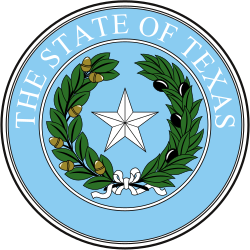Democrats had held control of the Texas House of Representatives since Reconstruction despite Republicans winning the governorship in 1994 and the Texas Senate in 1996. [3] [4] In the 2000 elections, Democrats had heavily emphasized the need to maintain control of the chamber to combat a potential Republican gerrymander after the next census. Their heavy investments in key races allowed them to maintain control of the chamber despite governor George W. Bush's victory in the state in the concurrent presidential election. [5] [6]
Redistricting
Following the release of the 2000 census results, the divided Texas Legislature attempted to undergo its decennial redistricting responsibility, but it failed. [7] Many Republicans in the legislature had felt no pressure to redistrict their own lines as control would fall to the Legislative Redistricting Board, which was controlled by Republicans, if they failed to do so. The districts that the board drew were seen as highly favorable to Republicans. [8] Challenges by the Mexican American Legal Defense and Educational Fund and the Department of Justice altered the board's state House districts, while keeping the state Senate map intact. [9] The Board had attempted to draw Democratic Speaker Pete Laney out of his west Texas district, but this had the ripple effect of reducing the Hispanic population in district 74 along the Texas–Mexico border. The Board agreed to revert this change, allowing the map to pass preclearance. [10]
House districts follow the "county line rule," effectively granting individual counties delegations of state house seats based on their population. [11] The census found that Texas had a population of 20,851,820 in 2000, [12] giving each district an "ideal population" of 139,006 people. In 1990, the "ideal population for a district" was 113,006 people. Counties with at least this number of people must fully contain at least one state house district. Counties with sufficient population for two or more districts must be divided into that number of districts. Should a county have sufficient population for one or more district plus a fraction of another, one district from another county may extend into it to represent the remaining population. District delegations for counties with at least one district changed as follows following the 2000 Census: [13]
| County | 1990 pop. | Seats | Partial | 2000 pop. [12] | Seats | Partial | +/– W | +/– P |
|---|
| Bell County | 191,073 | 1 | Yes | 238,000 | 1 | Yes |  |  |
| Bexar County | 1,185,394 | 11 | No | 1,393,035 | 10 | No |  1 1 |  |
| Brazoria County | 191,707 | 1 | Yes | 241,805 | 1 | Yes |  |  |
| Brazos County | 121,862 | 1 | Yes | 152,436 | 1 | Yes |  |  |
| Cameron County | 260,120 | 2 | Yes | 334,884 | 2 | Yes |  |  |
| Collin County | 264,036 | 2 | Yes | 491,272 | 3 | Yes |  1 1 |  |
| Dallas County | 1,852,691 | 16 | No | 2,216,808 | 16 | No |  |  |
| Denton County | 273,644 | 2 | Yes | 433,065 | 3 | No |  1 1 |  |
| Ector County | 118,934 | 1 | Yes | 121,124 | 0 | Yes |  1 1 |  |
| El Paso County | 591,610 | 5 | No | 679,568 | 5 | No |  |  |
| Fort Bend County | 225,421 | 2 | No | 354,286 | 2 | Yes |  |  |
| Galveston County | 217,396 | 2 | No | 250,178 | 1 | Yes |  1 1 |  |
| Harris County | 2,818,101 | 25 | No | 3,401,139 | 25 | No |  |  |
| Hidalgo County | 383,545 | 3 | Yes | 569,099 | 4 | No |  1 1 |  |
| Jefferson County | 239,389 | 2 | Yes | 251,968 | 1 | Yes |  1 1 |  |
| Lubbock County | 222,636 | 2 | No | 242,644 | 1 | Yes |  1 1 |  |
| McLennan County | 189,123 | 1 | Yes | 213,525 | 1 | Yes |  |  |
| Montgomery County | 182,201 | 1 | Yes | 293,779 | 2 | Yes |  1 1 |  |
| Nueces County | 291,145 | 2 | Yes | 313,512 | 2 | Yes |  |  |
| Smith County | 151,309 | 1 | Yes | 174,861 | 1 | Yes |  |  |
| Tarrant County | 1,170,103 | 10 | No | 1,449,290 | 10 | No |  |  |
| Taylor County | 119,655 | 1 | Yes | 126,606 | 0 | Yes |  1 1 |  |
| Travis County | 576,407 | 5 | No | 811,776 | 6 | No |  1 1 |  |
| Webb County | 133,239 | 1 | Yes | 193,124 | 1 | Yes |  |  |
| Wichita County | 122,378 | 1 | Yes | 131,695 | 0 | Yes |  1 1 |  |
| Williamson County | 139,551 | 1 | Yes | 250,466 | 1 | Yes |  |  |
As a result of these changes, the following districts drastically moved:
- District 20 moved from East Texas to Williamson County.
- District 46 moved from Hays County to Travis County.
- District 70 moved from West Texas to Collin County.
- District 80 moved from the Permian Basin to South Texas.
- District 89 moved from Tarrant County to Collin County.
- District 99 moved from Dallas County to Tarrant County.
- District 115 moved from Bexar County to Dallas County.



